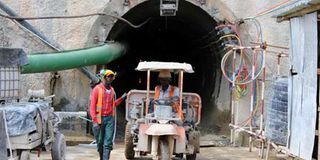Nairobi has no special status to draw Murang'a water for free

Northern Water Collector Tunnel in Murang'a County which is intended to supply water to Nairobi. FILE PHOTO | NATION MEDIA GROUP
What you need to know:
- From what I can gather, Wa Iria’s campaign is enjoying solid public support in his county.
- The argument, as I have heard it, is that there exists no problem between Murang’a and the downstream counties through which its rivers flow from the Aberdares to the Indian Ocean. However, when somebody outside this river basin wants to extract its water, there has to be a quid pro quo.
Murang’a Governor Mwangi Wa Iria can throw stinging verbal barbs. “Murang’a people can no longer afford to provide free water to Nairobi residents for them to use to cool off like crocodiles in their swimming pools,” he told a public meeting recently. What he was basically saying in less colourful language is that his county is no longer keen to keep satisfying the capital city’s enormous thirst for water unless there is some compensation.
The water war the governor has lately ignited is really about the Northern Collector Tunnel project, a Sh6.8 billion World Bank-funded scheme that will add 140 million litres every day to Nairobi’s water supply. The project is harvesting the water through underground tunnels from three key River Tana tributaries that flow in the valleys of Murang’a County. Wa Iria, together with county MCAs, have been sounding the alert that this massive harvesting of the county’s water resources will undermine its environmental well-being, and also that of the semi-arid downstream counties of Machakos, Garissa and beyond, that depend on the Tana.
NDAKAINI
Worse, this harvesting is being done without consideration or compensation of any kind to Murang’a people, whose farming livelihoods will be turned upside down if these same rivers shrink. In addition to the Northern Collector Tunnel’s expected water intake when it is completed, Nairobi’s present water supply is largely sourced from Ndakaini Dam, which is also in Murang’a.
In fact, Governor Wa Iria’s beef is not with Nairobi County per se. It is with the national government, which was the contract partner of the World Bank. Still, the water being tapped by the tunnels is for the city’s use, and will be commercially distributed by the Nairobi Water and Sewerage Company. What the Murang’a government wants is a formula that will accommodate both the interests of the vendor and the source. Wa Iria has pitched for his county to get 25 per cent from the project’s proceeds.
The narrative of crude cash-for-water has distorted the debate. If I remember correctly, Murang’a had long ago raised the matter of another form of compensation with the Athi Water Services Board — the government agency overseeing the construction of the tunnel. From what I hear, the government had committed — simultaneously as the tunnels were being dug — to spend Sh2.6 billion to supply water to the many Murang’a households that are not yet connected, especially in the drier lower wards of the county like Ithanga and Kambiti that neighbour Machakos County. The promise went unfulfilled.
ARGUMENTS
From what I can gather, Wa Iria’s campaign is enjoying solid public support in his county.
“Murang’a is not some kind of water reservoir for Nairobi to be running to exploit whenever it can’t control its population,” goes another barb thrown by one of the governor’s political operatives. That aside, the standoff is a good illustration of how devolution is reshaping the relationships between and amongst counties themselves, as well as with the national government. Even the humblest farmhand in Murang’a has an idea of the compensation agreement Turkana County struck with the central government for its oil. They also know that Kwale County signed something similar over titanium mining. Whether one likes it or not, water is a resource like titanium or oil or any other. It can and does get monetised.
The argument, as I have heard it, is that there exists no problem between Murang’a and the downstream counties through which its rivers flow from the Aberdares to the Indian Ocean. However, when somebody outside this river basin wants to extract its water, there has to be a quid pro quo. Nairobi may be the capital city of Kenya but, under our devolved system, it is a county like any other. It should not expect to be treated as a special case by other counties whose resources it covets. There has to be some trade-off. In this day and age, for example, you cannot just drive your lorry from Nairobi or wherever to harvest sand in Makueni’s river beds without paying a levy for it.
The concept of different jurisdictions buying and selling water in cash or whatever form is well established globally. The western US state of Colorado, which has always had a severe water deficit, has over the years designed what is for all practical purposes a “water market” where its cities, farmers and ranchers trade in “water rights”. In this fascinating system, water is bought, sold and even rented like any commercial commodity. Something similar is in place across the basin of the Murray and Darling rivers in south-eastern Australia, where farmers who have conserved water can sell their excess allotments to the cities, or to other farmers.
The Murang’a governor’s message is simple: Nairobi, or anybody else for that matter, should not expect free, uninterrupted water indefinitely.




